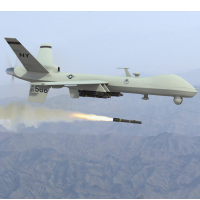Federal Appeals Panel Orders CIA to Reveal Info about Drones

Advocates of open government and civil liberties scored three legal victories last week against state secrecy and the murky national security exception to the Constitution, including rulings striking down
national security letters, ordering the CIA to reveal information about its drone assassination program, and approving a settlement that forces the government to disclose details about the “Secure Communities” deportation program.
In the CIA drones case, a panel of the Court of Appeals for the District of Columbia Circuit ordered the CIA to provide to a judge a description of its records on drone strikes, which were requested via a Freedom of Information Act (FOIA) request filed by the American Civil Liberties Union in 2010. The CIA replied to the FOIA request with a Glomar response, refusing to confirm or deny the existence of relevant records, which the court rejected.
The Glomar response originated in the case of Phillippi v. CIA (D.C. Circuit, 1976) in which the DC Circuit allowed the CIA to respond to a FOIA request by refusing to confirm or deny whether it had documents relating to Howard Hughes’ ship, the Glomar Explorer, which press reports said the agency had used in an attempt to recover a sunken Soviet submarine from the bottom of the Pacific ocean. The court accepted the CIA’s argument that the fragmentary press reports had not let the entire “cat out of the bag,” and that for the CIA even to acknowledge that it had documents about the ship or its mission would reveal secrets and harm national security.
In the case of the drone program, however, the ACLU successfully argued that public comments about the program by high U.S. officials—including President Barack Obama, former CIA Director and Defense Secretary Leon Panetta, and new CIA Director John Brennan—rendered a Glomar response moot. In an opinion by Chief Judge Merrick B. Garland, who was appointed in 1997 by President Bill Clinton and is considered a potential Supreme Court nominee, the court agreed.
Calling the CIA’s position “indefensible,” the court found that “as it is now clear that the agency does have an interest in drone strikes, it beggars belief that it does not also have documents relating to the subject,” and concluded that “the CIA asked the courts to stretch that [Glomar] doctrine too far—to give their imprimatur to a fiction of deniability that no reasonable person would regard as plausible.”
“Given these official acknowledgments that the United States has participated in drone strikes, it is neither logical nor plausible for the CIA to maintain that it would reveal anything not already in the public domain to say that the agency ‘at least has an intelligence interest’ in such strikes,” wrote Garland.
Yet the public may not see CIA documents about the targeted killing program anytime soon. Last week’s decision sends the case back to Judge Rosemary Collyer, a conservative George W. Bush appointee, who accepted the CIA’s Glomar response the first time around.
Jameel Jaffer, an ACLU attorney who argued the case in September, nevertheless praised the ruling as “an important victory” that “requires the government to retire the absurd claim that the CIA’s interest in the targeted killing program is a secret, and it will make it more difficult for the government to deflect questions about the program’s scope and legal basis. It also means that the CIA will have to explain what records it is withholding, and on what grounds it is withholding them.”
The ACLU has also brought a separate FOIA case in New York, seeking documents related to the assassination of American citizens, including Anwar al-Awlaki and his 16-year-old son, Abdulrahman al-Awlaki, who were killed by the CIA during drone strikes in Yemen in 2011. That case has not yet been resolved.
The CIA is almost certain to appeal the current decision, either to the entire D.C. Circuit or to the U.S. Supreme Court.
-Matt Bewig
To Learn More:
Appeals Court Rejects CIA’s Argument over Acknowledging Drone Operations (by Peter Finn and Julie Tate, Washington Post)
Court Orders the C.I.A. to Disclose Drone Data (by Charlie Savage, New York Times)
CIA Can’t Deny the Existence of Drone Strike Records, Court Rules (by Annie Youderian, Courthouse New Service)
ACLU v. CIA (D.C. Circuit, 2013) (pdf)
Secret U.S. Government Memo Justifies Assassinations of American Citizens (by Noel Brinkerhoff, AllGov)
- Top Stories
- Unusual News
- Where is the Money Going?
- Controversies
- U.S. and the World
- Appointments and Resignations
- Latest News
- Musk and Trump Fire Members of Congress
- Trump Calls for Violent Street Demonstrations Against Himself
- Trump Changes Name of Republican Party
- The 2024 Election By the Numbers
- Bashar al-Assad—The Fall of a Rabid AntiSemite






Comments